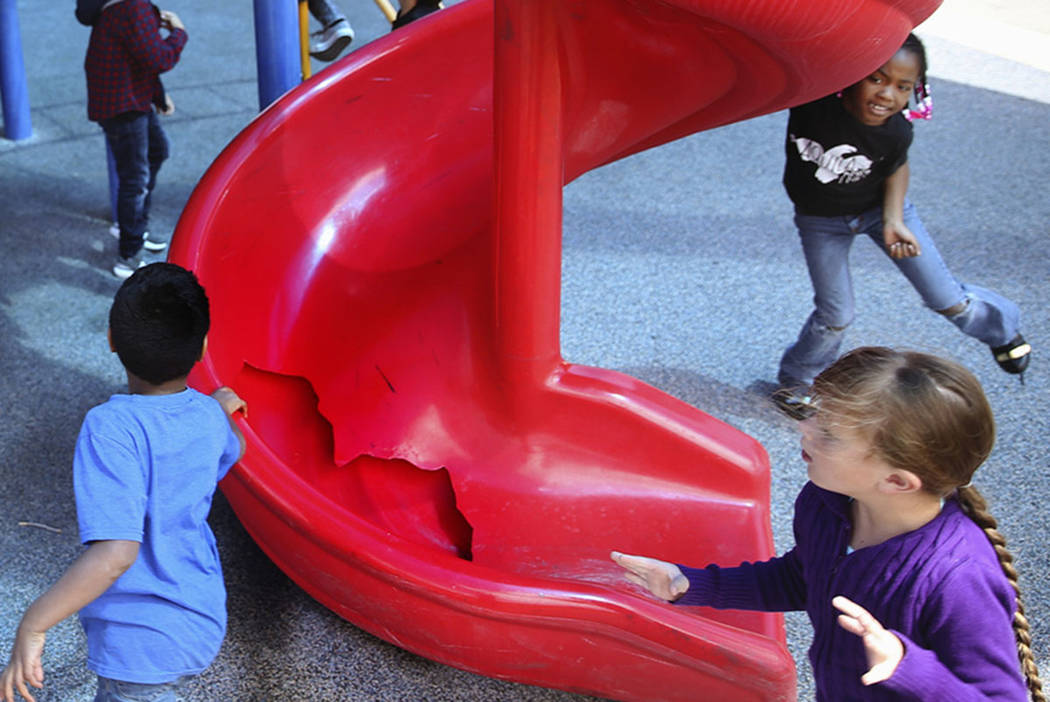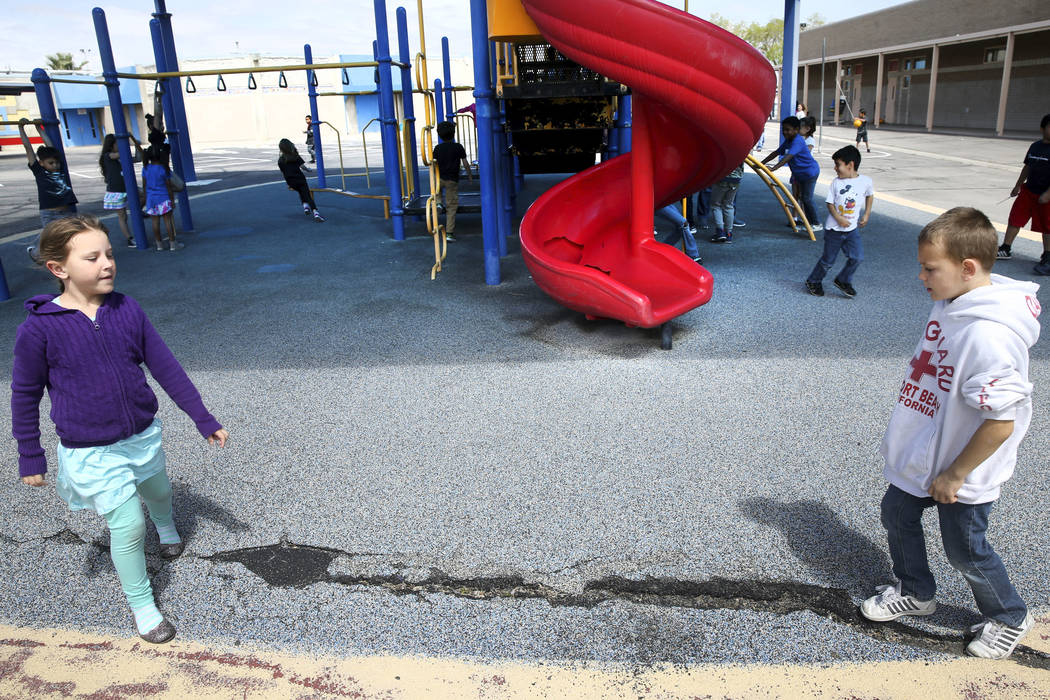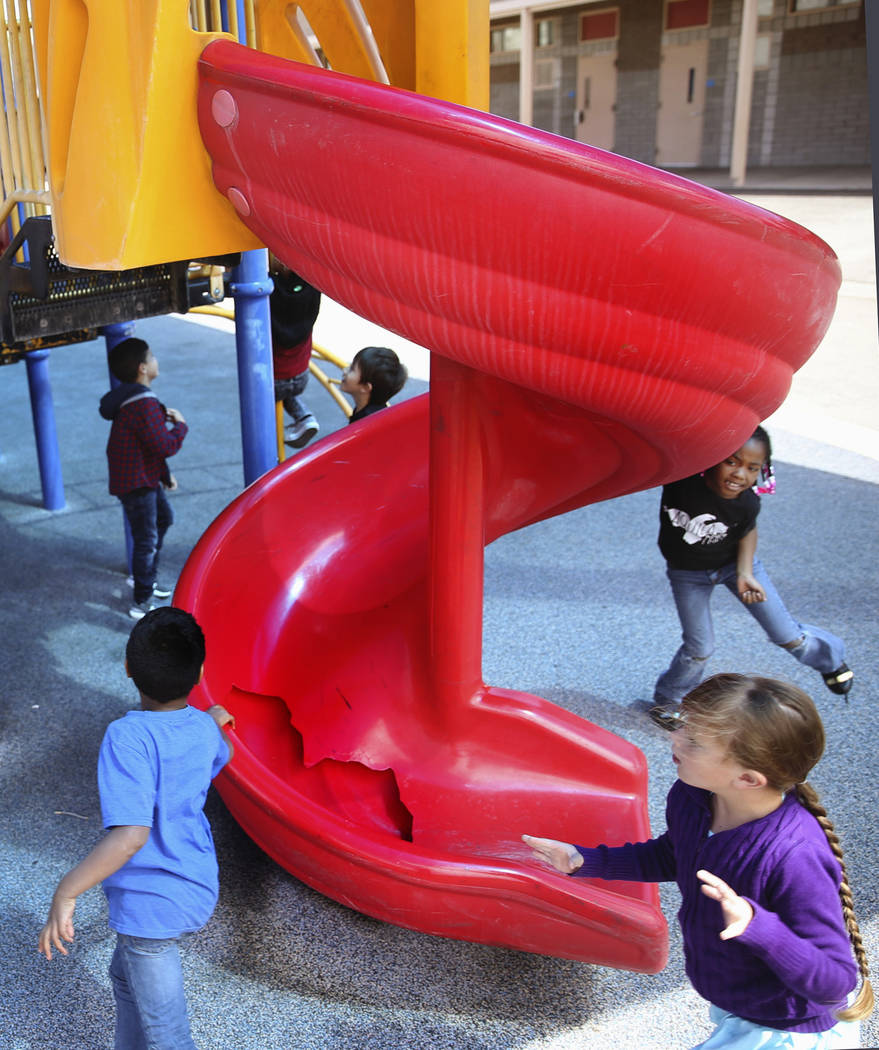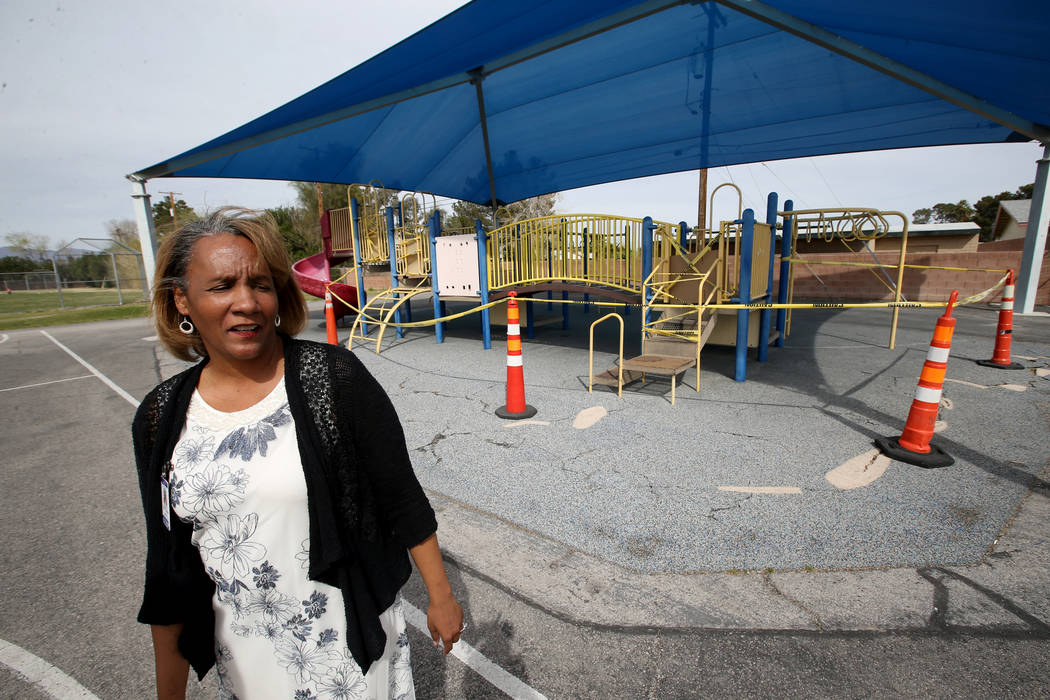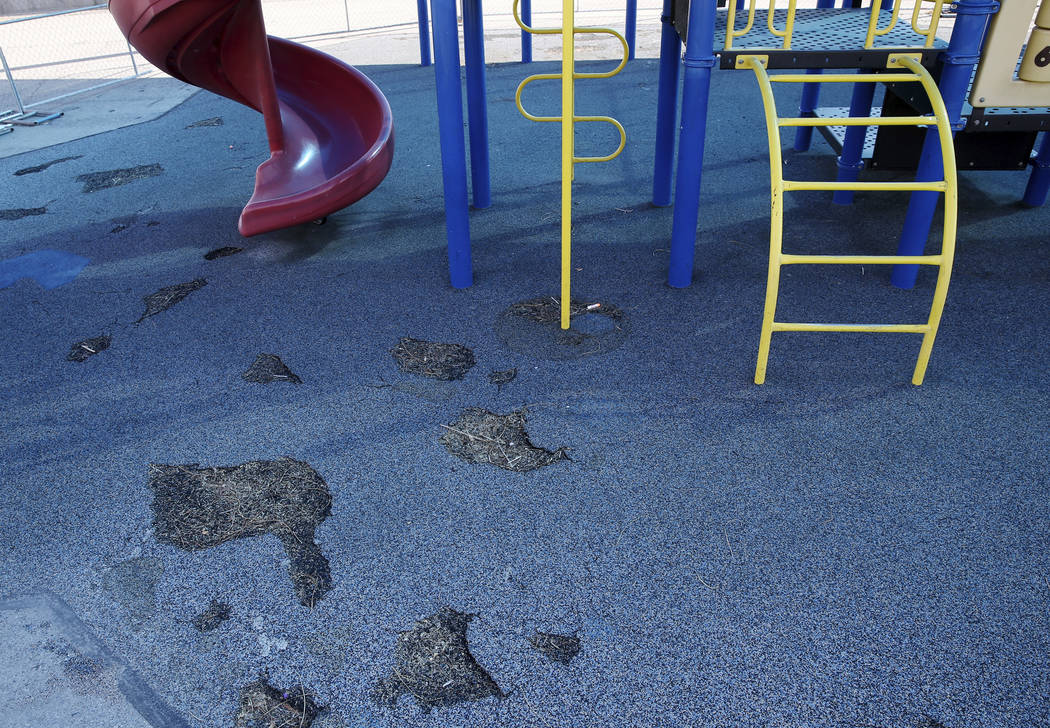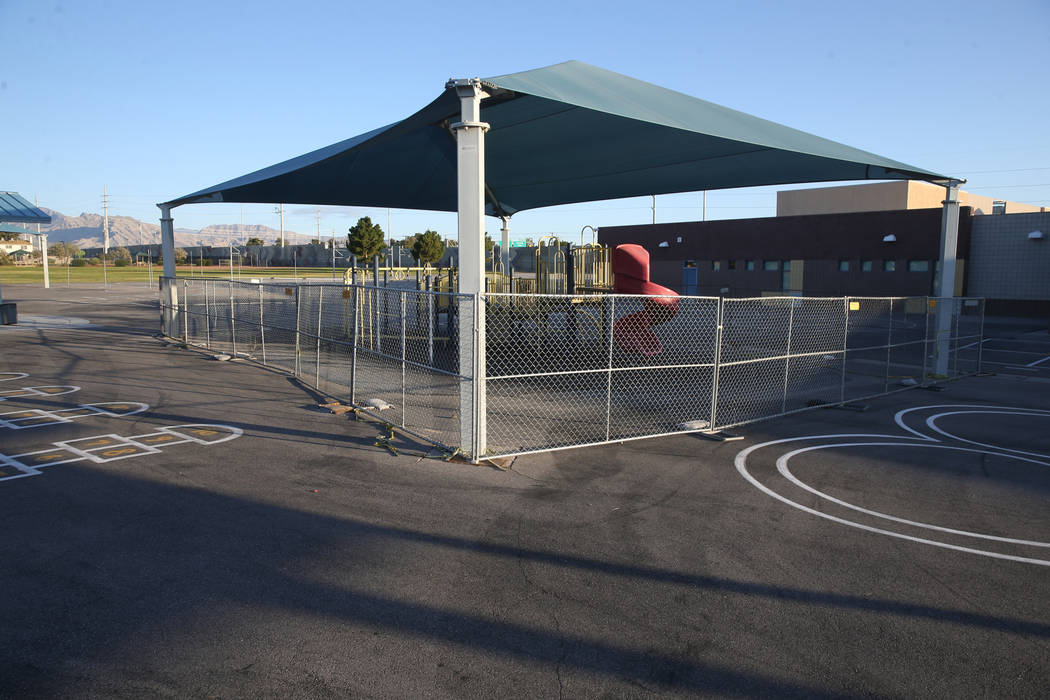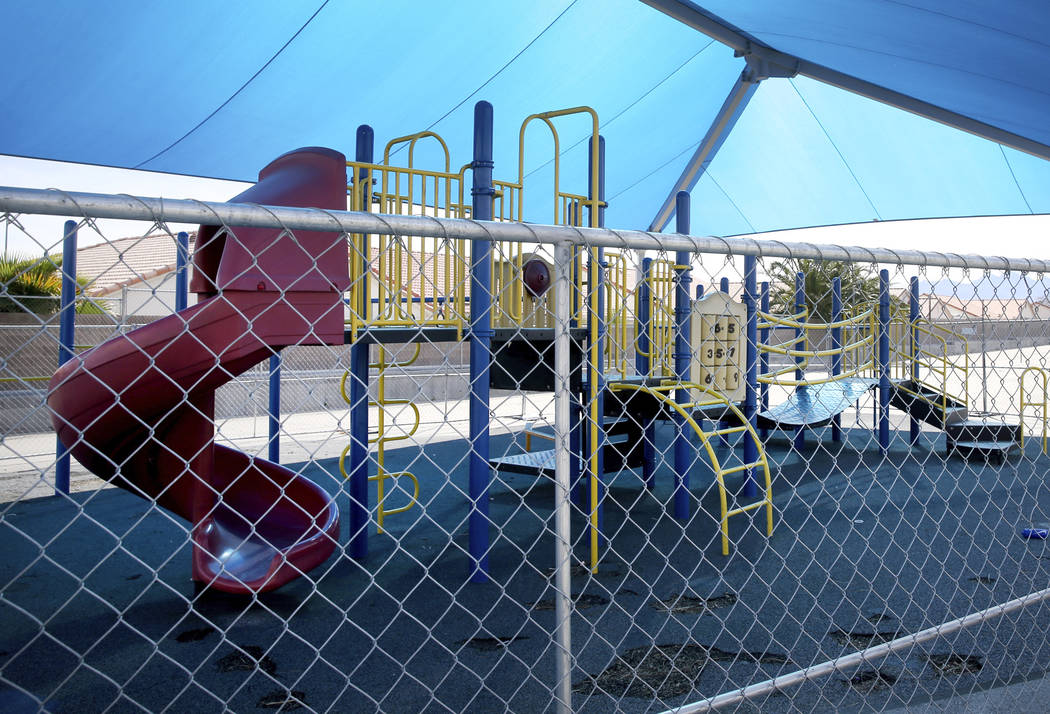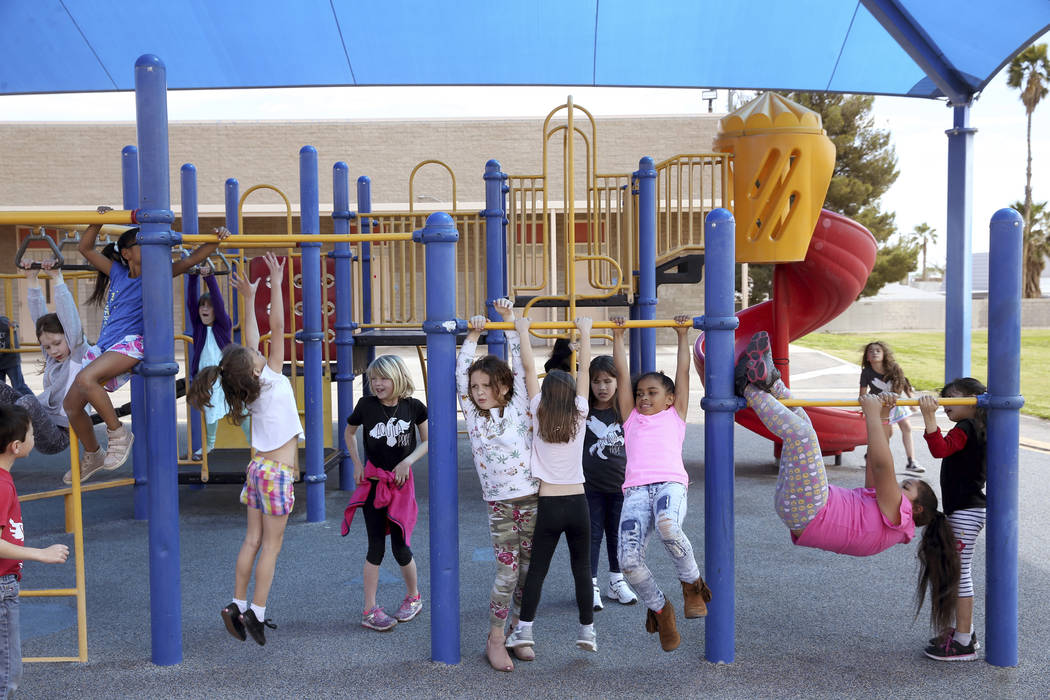Playgrounds at some Clark County schools falling into disrepair
Broken slides. Gaping cracks in the ground. Entire areas fenced off from children.
These are just a few scenes of disrepair at the Clark County School District’s roughly 700 playgrounds.
Playtime is an important part of school for young students, but a review of school district and Southern Nevada Health District records shows that many playgrounds have broken equipment, uneven surfaces or unrepaired problems that pose a risk of injury. Some are in such bad shape they can’t be used.
When such facility issues arise, schools submit work orders, which must be approved before work can begin.
But as of early April, elementary schools across the district were still waiting for over 400 issues to be fixed — some dating back to February 2018, according to district data.
Records from the health district, which inspects public playgrounds, also show at least 15 repeat violations at school facilities, including at least 13 schools that had not had the safety issues addressed over a period of months.
In some instances, the wear and tear of recess has forced some playgrounds to be closed. At least nine schools had at least one closed playground as of early May.
“It was really inconvenient for the kids,” Lorena Roios, a parent at Hoggard Elementary, said about a playground there that was closed until recently. “And we as parents don’t understand why it takes that long for them to fix it.”
Broken playgrounds
Cracks in the pavement that can cause a tripping hazard are the biggest issue on school playgrounds, according to health inspection reports and district work orders. The other major issue is broken equipment — holes in slides, loose gymnastic bars or tricycles that are missing hand grips, for example.
In some cases, the issues already have caused injuries.
“Student tripped and fell from a crack on the SW basketball court causing his tooth to chip and fall out,” reads one work order request for Darnell Elementary in October 2018.
“The rubber around our playground area closest to the school is missing in a lot of spots, leaving sharp metal parts (uncovered),” reads one request from Mendoza Elementary in March. “We already had a special ed preschool student split his head open due to the unsafe equipment.”
Work order requests also show frustration over longstanding issues at playgrounds.
“Have put a number of work orders in over a few years and still have full surface issues on all three areas,” wrote one staff member at Mitchell Elementary in November. “(Health department) wrote it up again.”
Perkins Elementary requested the same fix for its playgrounds a few months earlier in September.
“This work order is one of many placed for these repairs,” staff wrote.
Health district inspectors have cited repeat violations in at least 13 schools from January 2018 to this spring, according to inspection reports.
The repeated violations all pertain to playground surfacing, mainly around high-traffic areas — at the bottom of slides, near fire poles or underneath hanging bars. Health inspectors check playgrounds at least twice per year and can issue fines of $239 if hazardous violations aren’t corrected or staff can’t show that they’re working to fix the problem.
But Mark Bergtholdt, environmental health supervisor at the health district, said the hazard must be pretty severe for that to happen. The health district has not issued any fines to schools in recent months, he said.
The district is good at immediately fixing imminent hazards, Bergtholdt said, but fixing issues with a playground surface is often tougher.
“That becomes a little more difficult and they have to close the playground for a period of time,” he said. “But the school district’s always been responsive in taking the action to close that and fix it, maybe during a break or something like that.”
An ongoing, larger issue
Broken playgrounds are just one aspect of the district’s maintenance needs.
The district, which just announced the hiring of a new chief of facilities, has $6 billion in deferred maintenance needs — work needed to prolong the life of its buildings.
Replacing playgrounds that are beyond repair, however, would cost an additional $30 million to $40 million on top of that, according to the district.
Two technicians complete small work order requests, the district said in a statement. Larger fixes are contracted to an outside company. That means going through the lengthy process of putting a project out for public bidding.
“Due to the large number of playground units currently in inventory (over 700), major repairs take several months to complete. Every effort is made to reopen closed playgrounds as soon as possible,” a spokesman said in a statement. “CCSD staff are working to improve the process and decrease the time from identification of necessary repairs/replacement to completion.”
The issue is an ongoing one. Last year, students at Stanford Elementary called for a fix to their blacktop as parents expressed frustration over the worsening issue.
And although most schools have multiple playgrounds, staff have to work around playground closures.
At Adcock Elementary, which has had one playground closed since September and has another scheduled for closure, smaller children play on a playground built for older students, said Principal Wendy DeMille.
“I’ve had the parents complain (and) ask, ‘What’s going on with this? How long is it going to take?’” she said.
Students are allowed to use a nearby grassy field during recess, although that places them closer to the city park, where people are often sleeping on benches or where older students skipping school may harass younger students, DeMille said.
At Hoggard Elementary, parents wondered why they couldn’t just fix one of their playgrounds by themselves instead of waiting for the district to address it, said Roios, who has one daughter at the school.
“You can’t go that way, because you have to respect the time and the schedules that CCSD has,” Roios said. “And sometimes it just — it takes too long.”
Contact Amelia Pak-Harvey at apak-harvey@reviewjournal.com or 702-383-4630. Follow @AmeliaPakHarvey on Twitter.



